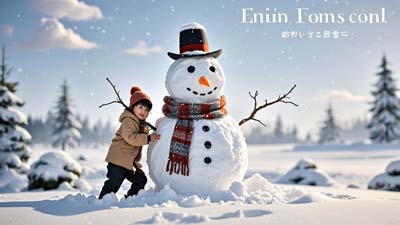| 冬 (dōng) Winter |
|

|
拼音 (pīnyīn) pinyin: dōng |
| 笔画 (bǐhuà) number of strokes: 5 | |
| 含义 (hányì) meaning: winter | |
| 笔顺 (bǐshùn) stroke order: | |

|
|
词源 (cíyuán) Etymology: In the Chinese lunar calendar, winter is the last season of each year, for this reason the character “终 (zhōng) end” was used in ancient times. Later, this character was changed to “冬.” The radical “夂” represents ice, slush and rooftops. The remaining partrepresents people. The character refers to how people stay inside their homes during the winter, because it is cold and unpleasant outside.
部首 (bùshŏu) Radical: 夂
常用词语 (chángyòng cíyŭ) Frequently Used words:
冬天 (dōngtiān): n. winter
Example:
Dōngtiān dào le, hǎo qīdài xiàxuě a.
A: 冬天 到 了,好 期待 下雪 啊。
Winter is coming. I’m hoping for snow.
Tīngshuō xiàzhōu huì xiàxuě ne.
B: 听说 下周 会 下雪 呢。
I heard that it will snow next week.
冬至(dōngzhì): n. winter solstice
Example:
Nǐ zhīdào dōngzhì yào chī jiǎozi de xísú ma?
A: 你知道 冬至 要 吃 饺子 的 习俗 吗?
Do you know that people should eat dumplings during the Winter Solstice?
Dāngrán le, chī jiǎozi jiù bú huì dòng ěrduo le.
B: 当然 了,吃 饺子 就不 会 冻 耳朵 了。
Of course, eating dumplings prevents our ears from getting frostbite.
Culture Note:
Winter Solstice is one of the twenty-four solar terms and a traditional festival for the Han ethnic group. The Winter Solstice is a day between December 21 and 23 on the solar calendar. It occurs just before Christmas. The following is an ancient legend: If you don’t eat dumplings on the Winter Solstice, your ears will get frostbite.
Learn More Chinese Characters
Learn the Chinese Character: 山 (shān) Mountain
Learn the Chinese Character: 爱 (ài) Love
Learn the Chinese Character:
你 (nĭ) You
HSK Test
General Chinese (Beginner Level)
General Chinese (Intermediate Level)





I would like to thank you for having this web blog available. It is a fantastic tool. I hope to continue learning and practicing my everyday chinese.
You are great!
Mr. William
This is so helpful. I would like to learn the Chinese characters for the other seasons.
春 spring, 夏 summer, 秋 autumn. How can I talk about the coldness of winter in Chinese?
You can learn the Chinese characters 寒冷. But in daily life, people usually say 好冷啊 and 冷死了. All of these expressions mean “very cold.”
All of your examples are excellent. it makes easy every one to learn chinese characters too.